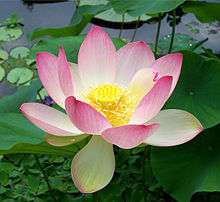Bhaishajyaraja
Bhaiṣajyarāja (Skt: भैषज्यराज; Traditional Chinese: 藥王; Simplified Chinese: 药王; pinyin: yào wáng; Japanese: 薬王 Yakuō; Vietnamese: Dược Vương Bồ Tát), or Medicine King, is a bodhisattva mentioned within the Lotus Sutra and the Bhaiṣajyarāja-bhaiṣajyasamudgata-sūtra (Chinese: 佛說觀藥王藥上二菩薩經; Sūtra Spoken by the Buddha on Visualizing the Two Bodhisattvas Bhaisajyarāja and Bhaisajyasamudgata).[1][2][3] In chapter 23 of the Lotus Sutra (The Bodhisattva Bhaiṣajyarāja), the Buddha tells the story of the 'Medicine King' Bodhisattva, who, in a previous life, burnt his body as a supreme offering to a Buddha.[4][5][6] He is said to have been reborn over a period of numerous lifetimes healing and curing diseases, and is a representation of the healing power of the Buddha.
| Bhaiṣajyarāja | |
|---|---|
| Sanskrit | भैषज्यराज
Bhaiṣajyarāja |
| Chinese | (Traditional) 藥王菩薩 (Simplified) 药王菩萨 (Pinyin: Yàowáng Púsà) |
| Japanese | (romaji: Yakuō Bosatsu) |
| Korean | 약왕보살
(RR: Yagwang Bosal) |
| Vietnamese | Dược Vương Bồ Tát |
| Information | |
| Venerated by | Mahāyāna, Vajrayāna |
| Part of a series on |
| Mahāyāna Buddhism |
|---|
 |
|
Transmission |
|
Teachings
|
|
Mahāyāna sūtras |
Notes
- Buswell, Robert Jr; Lopez, Donald S. Jr., eds. (2013). Princeton Dictionary of Buddhism. Princeton, NJ: Princeton University Press. p. 109. ISBN 9780691157863.CS1 maint: ref=harv (link)
- Watson, Burton (tr.) (2009). The Lotus Sutra and Its Opening and Closing Chapters. Tokyo: Soka Gakkai. ISBN 978-4-412-01409-1, pp. 321-330
- Kern, H. (tr.) (1884). Saddharma Pundarîka or the Lotus of the True Law. Sacred Books of the East, Vol. XXI, Oxford: Clarendon Press
- Williams 1989, p. 160.
- Benn 2007, p. 59.
- Ohnuma 1998, p. 324.
References
- Benn, James A (2007), Burning for the Buddha, University of Hawaii Press, ISBN 0824823710
- Ohnuma, Reiko (1998), "The Gift of the Body and the Gift of Dharma", History of Religions, 37 (4): 323–359, JSTOR 3176401
- Suzuki, Takayasu (2014). The Compilers of the Bhaisajyarajapurvayoga-parivarta Who Did Not Know the Rigid Distinction between Stupa and Caitya in the Saddharmapundarika. Journal of Indian and Buddhist Studies 62 (3), 1185-1193
- Williams, Paul (1989), Mahāyāna Buddhism: the doctrinal foundations, 2nd Edition, Routledge, ISBN 9780415356534
- Yün-hua, Jan (1965). Buddhist Self-Immolation in Medieval China, History of Religions, 4 (2), 243-268
